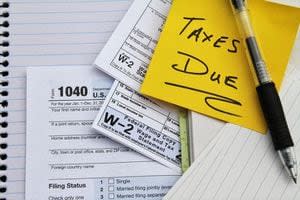IRS announces the official start of the 2024 tax season, find out the earliest you can file

Tax season is just around the corner, and the IRS announced the official start date of the 2024 tax season when the agency will begin accepting and processing 2023 tax returns.
▶ WATCH CHANNEL 9 EYEWITNESS NEWS
The IRS will officially start accepting and processing forms on Monday, Jan. 29.
The IRS expects more than 128.7 million individual tax returns to be filed by the April 1 tax deadline.
Even though the official start of tax season is still a couple of weeks away Americans do not need to wait until then to work on their taxes, most software companies accept electronic submissions and then hold them until the IRS is ready to begin processing later this month.
Also, IRS Free File will be available on IRS.gov starting Jan. 12.
Read: E-PASS toll discount program returns, how it helps drivers save money
The IRS Direct File pilot will be rolled out in phases as final testing is completed and is expected to be widely available in mid-March to eligible taxpayers in the participating states.
According to a news release, taxpayers will continue to see helpful changes at the IRS following ongoing transformation work and building off the success of the 2023 tax season that saw significant improvements following passage of the Inflation Reduction Act, the 2024 filing season will continue reflecting the focus on improving services to taxpayers.
“As our transformation efforts take hold, taxpayers will continue to see marked improvement in IRS operations in the upcoming filing season,” said IRS Commissioner Danny Werfel. “IRS employees are working hard to make sure that new funding is used to help taxpayers by making the process of preparing and filing taxes easier.”
Read: All-day park hopping returns to Disney World
Some of the new and expanded tools and resources include:
Expanded in-person service that meets taxpayers where they are by opening or reopening Taxpayer Assistance Centers (TACs). The IRS will also offer extended hours at many TACs nationwide.
Increased help available on the toll-free line and an expanded customer call back feature designed to significantly reduce wait times.
Improvements to the Where’s My Refund? tool, which is the IRS’ most widely used taxpayer service tool. However, the tool provides limited information, often leading taxpayers to call the IRS to inquire about their refund status. Updates to Where’s My Refund? will allow taxpayers to see more detailed refund status messages in plain language. These updates will also ensure Where’s My Refund works seamlessly on mobile devices. Taxpayers often see a generic message stating that their returns are still being processed and to check back later. With the improvements, taxpayers will see clearer and more detailed updates, including whether the IRS needs them to respond to a letter requesting additional information. The new updates will reduce the need for taxpayers to call the IRS for answers to basic questions.
Enhanced paperless processing that will enable taxpayers to submit all correspondence, non-tax forms, and responses to notices digitally and will be able to e-File 20 additional tax forms. Achieving this milestone will enable up to 125 million paper documents to be submitted digitally per year.
An enhanced IRS Individual Online Account that includes chat, the option to schedule and cancel future payments, revise payment plans and validate and save bank accounts.
A new, pilot tax filing service called Direct File that gives eligible taxpayers a new choice to file their 2023 federal tax returns online, for free, directly with the IRS. It will be rolled out in phases and is expected to be widely available in mid-March. Find more about Direct File pilot eligibility, scope and the participating states on Direct File.
Read: NASA announces delays for Artemis missions
For most taxpayers, the deadline to file their personal federal tax return, pay any tax owed or request an extension to file is Monday, April 15, 2024.
Taxpayers living in Maine or Massachusetts have until April 17, 2024, due to the Patriot’s Day and Emancipation Day holidays. If a taxpayer resides in a federally declared disaster area, they also may have additional time to file.
Click here to download our free news, weather and smart TV apps. And click here to stream Channel 9 Eyewitness News live.
